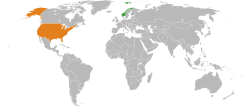Norway–United States relations
Bilateral relations From Wikipedia, the free encyclopedia
The United States and Norway have a very long tradition of positive relations.
 | |
Norway |
United States |
|---|---|
| Diplomatic mission | |
| Norwegian Embassy, Washington, D.C. | United States Embassy, Oslo |
The American Revolution of 1776 had a profound impact on Norway, and the democratic ideals of the United States Constitution served as a model for the authors of Norway's own Constitution of 1814, including Christian Magnus Falsen. The close relationship between the two nations was reinforced by massive Norwegian emigration to the U.S. during the period 1825–1940, when more than 850,000 Norwegians made new homes in the United States and helped build the nation.
After the liberation from German occupation in 1945, Norway abandoned its history of neutrality and joined NATO, stressing its military alliance and economic cooperation with Britain and the United States. The Marshall Plan helped Norway to modernize its economy and integrate more into the world market. It avoided any provocation that might offend the Soviet Union, its northern neighbor. Since the 1960s, Norway has been drawn increasingly into European affairs while the importance of ties to Britain and the United States has declined. Norway refuses to join the European Union, and engages in a largely independent foreign policy. There is a lingering desire for nonalignment, strengthened by the discovery of vast amounts of oil, that built up a huge rainy day fund in the treasury.[1]
The friendly state of the bilateral relationship was reinforced when King Harald V of Norway hosted the visit of U.S. President Bill Clinton in November 1999, the first visit to Norway by a U.S. President in office. The excellent relations between Norway and the United States, and the Mission in Oslo can focus its efforts on projects that serve mutual interests. Among them are expanding on the success of NATO in securing transatlantic security, promoting new business opportunities between the two nations, working with the Arctic Council to preserve the Arctic environment and with Russia in particular in the Barents Sea, helping the Baltic nations to find their place in the new Europe, and capitalizing on information technology to promote human rights and a sense of world community.
According to the 2012 U.S. Global Leadership Report, 46% of Norwegians approve of U.S. leadership, with 21% disapproving and 33% uncertain.[2]
Embassies
The United States maintains an embassy in Oslo. The United States Ambassador to Norway is in charge of the embassy of the United States in Oslo.
Principal U.S. officials:
- Chargé d'affaires ad interim – Eric Meyer
Norway maintains an embassy in Washington DC, United States, and three consulates; in New York City, Houston (Norwegian Consulate General, Houston) and San Francisco.
- The United States embassy in Oslo
- The Norwegian embassy in Washington, D.C.
Norwegian Americans
Summarize
Perspective




There are more than 4.5 million people of Norwegian ancestry in the United States today.[1] Of these, approximately three million claim "Norwegian" as their sole or primary ancestry.
- A little more than 2% of whites in the United States are of Norwegian descent. In the Upper Midwest, especially Minnesota, western Wisconsin, northern Iowa, and the Dakotas, more than 15% of whites are of Norwegian descent. Nearly one-third of all North Dakotans claim Norwegian as their ancestry.[3]
- 55% of Norwegian Americans live in the Midwest, although a large number (21%) live in the Pacific States of Washington, Oregon, and California.
- Norwegian Americans actively celebrate and maintain their heritage in many ways. Much of it centers on the Lutheran-Evangelical churches they were born into, but also culinary customs (lutefisk and lefse), costumes (bunad), and Norwegian holidays (Syttende Mai, May 17) are popular. A number of towns in the United States, particularly in the Upper Midwest, display very strong Norwegian influences.
- Although the Norwegians were the most numerous of all the Scandinavian immigrant groups, other Scandinavians also emigrated to America during the same time period. Today, there are 11–12 million Americans of Scandinavian ancestry. Scandinavian descendants represent about 6% of the white population in the United States as a whole, and more than 25% of the white population of the Upper Midwest.
- Norwegian Americans tend to be Lutheran (Norwegian-American Lutheranism), although substantial minorities are Roman Catholic or belong to other Protestant denominations.
- There are more people of Norwegian ancestry in America than in Norway. Historically high birth rates over the past hundred years among Norwegian Americans resulted in their roughly quadrupling in population over the original 850,000 immigrants.
Norwegian consulates in the United States
Summarize
Perspective
Houston
Minneapolis
In 1906 Norway opened a consulate in Minneapolis, Minnesota. It became a consulate-general in 1946.[4] In 2001 the Norwegian government planned to close the consulate but it stayed open after Norwegian American groups lobbied to keep it open. In 2007 the Norwegian government again announced plans to close the consulate and replace it with an honorary consulate; area Norwegian Americans criticized the outcome.[5]
The Minneapolis consulate served Minnesota, Iowa, Michigan, Montana, Nebraska, North Dakota, South Dakota, and Wisconsin.[6] In 2007 there were 850,000 people of Norwegian descent in Minnesota.[5] In 2007 the consulate had four permanent employees and an intern.[7]
In 2007, former U.S. Vice President Walter Mondale agreed to serve as Honorary Consul General.[8] He was succeeded by Gary Gandrud whose grandfather P.A. Gandrud had served in both the House of Representatives and Senate in the Minnesota legislature.[9] As of 2015[update] Eivind Heiberg, the CEO of Sons of Norway, is the honorary consul of Minneapolis.[10]
Miami
There was previously a Norwegian consulate in Miami that served Florida, Alabama, Georgia, North Carolina, South Carolina, and the Caribbean. The consulate closed on April 1, 2003. After its closure its territory was divided between the consulates in Houston, New York, Caracas, and Mexico City.[6]
See also
References
Further reading
External links
Wikiwand - on
Seamless Wikipedia browsing. On steroids.




